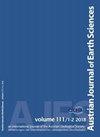Revised Badenian (middle Miocene) depositional systems of the Austrian Vienna Basin based on a new sequence stratigraphic framework
IF 1.1
4区 地球科学
Q2 Earth and Planetary Sciences
引用次数: 16
Abstract
Abstract This paper presents a revised sequence stratigraphy for the lower, middle and upper Badenian depositional systems of the Austrian Vienna Basin based on the integration of 3D seismic surveys and well data. The study area in the central and northern part of the Austrian Vienna Basin is covered with 3D seismic data. According to a new sequence stratigraphic framework established in the southern part of the Vienna Basin, the Badenian is subdivided into three 3rd order depositional sequences. For each sequence, paleogeographic maps are created, representing coeval depositional systems within a chronostrati-graphic interval. Lower Badenian sediments of the 1st sequence (Ba1) represent fillings of the pre-Badenian sub-basins with a major change of sediment transport direction. The early stage of the 1st sequence is dominated by subaerial braided river deposits which use two pronounced canyon systems (Mistelbach Canyon and Reinthal Canyon) on the northwestern margin of the Vienna Basin as a bypass zone towards the marine depositional system of the North Alpine-Carpathian Foredeep. The late stage of the 1st sequence reflects the change from subaerial to marine depositional environments with main sediment influx from the west, creating two major eastwards prograding delta systems (Zistersdorf Delta and Mühlberg Delta). Depositional systems of the middle Badenian 2nd sequence (Ba2) reflect the interplay between ongoing extensional fault tectonics and major sea-level changes. Lower Badenian paleo-highs in the northern part are drowned during the 3rd sequence (Ba3), thus the Mühlberg Delta and the Zistersdorf Delta merge into one delta system. During the Ba3 the drowning of the Spannberg Ridge initiates a clockwise rotation of the Zistersdorf Delta. Thus, the former Zistersdorf Delta transforms into the Matzen Delta covering the Spannberg Ridge. Together with the Mühlberg Delta, they represent the last full marine depositional system of the eastward prograding paleo-Danube Delta in the Austrian Vienna Basin.基于新层序地层格架的奥地利维也纳盆地巴登世(中中新世)沉积体系修正
摘要本文结合三维地震勘探和井资料,对奥地利-维也纳盆地巴登尼亚沉积体系的下、中、上三个沉积体系进行了层序地层学修正。奥地利-维也纳盆地中部和北部的研究区域覆盖着3D地震数据。根据维也纳盆地南部新建立的层序地层格架,将Badenian细分为三个三级沉积层序。对于每个层序,都会创建古地理图,表示时间地层间隔内的同时代沉积系统。第1序列的下巴登尼亚沉积物(Ba1)代表了前巴登尼亚亚盆地的填充物,沉积物输移方向发生了重大变化。第1层序的早期阶段以陆上辫状河沉积为主,该沉积利用维也纳盆地西北边缘的两个明显的峡谷系统(Mistelbach canyon和Reinthal canyon)作为通往北阿尔卑斯喀尔巴阡前渊海洋沉积系统的旁路带。第1层序的晚期反映了从陆上沉积环境到海洋沉积环境的变化,主要沉积物从西部流入,形成了两个主要的向东推进的三角洲系统(Zistersdorf三角洲和Mühlberg三角洲)。巴登尼亚中部第二层序(Ba2)的沉积系统反映了正在进行的伸展断层构造和主要海平面变化之间的相互作用。北部的下巴登尼亚古高点在第三层序(Ba3)中被淹没,因此Mühlberg三角洲和Zistersdorf三角洲合并为一个三角洲系统。在Ba3期间,斯潘伯格山脊的淹没引发了齐斯特斯多夫三角洲的顺时针旋转。因此,从前的Zistersdorf三角洲转变为覆盖斯潘贝格山脊的Matzen三角洲。它们与Mühlberg三角洲一起代表了奥地利-维也纳盆地向东推进的古多瑙河三角洲的最后一个完整的海洋沉积体系。
本文章由计算机程序翻译,如有差异,请以英文原文为准。
求助全文
约1分钟内获得全文
求助全文
来源期刊

Austrian Journal of Earth Sciences
Earth and Planetary Sciences-Paleontology
CiteScore
3.10
自引率
0.00%
发文量
0
审稿时长
>12 weeks
期刊介绍:
AUSTRIAN JOURNAL OF EARTH SCIENCES is the official journal of the Austrian Geological, Mineralogical and Palaeontological Societies, hosted by a country that is famous for its spectacular mountains that are the birthplace for many geological and mineralogical concepts in modern Earth science.
AUSTRIAN JOURNAL OF EARTH SCIENCE focuses on all aspects relevant to the geosciences of the Alps, Bohemian Massif and surrounding areas. Contributions on other regions are welcome if they embed their findings into a conceptual framework that relates the contribution to Alpine-type orogens and Alpine regions in general, and are thus relevant to an international audience. Contributions are subject to peer review and editorial control according to SCI guidelines to ensure that the required standard of scientific excellence is maintained.
 求助内容:
求助内容: 应助结果提醒方式:
应助结果提醒方式:


